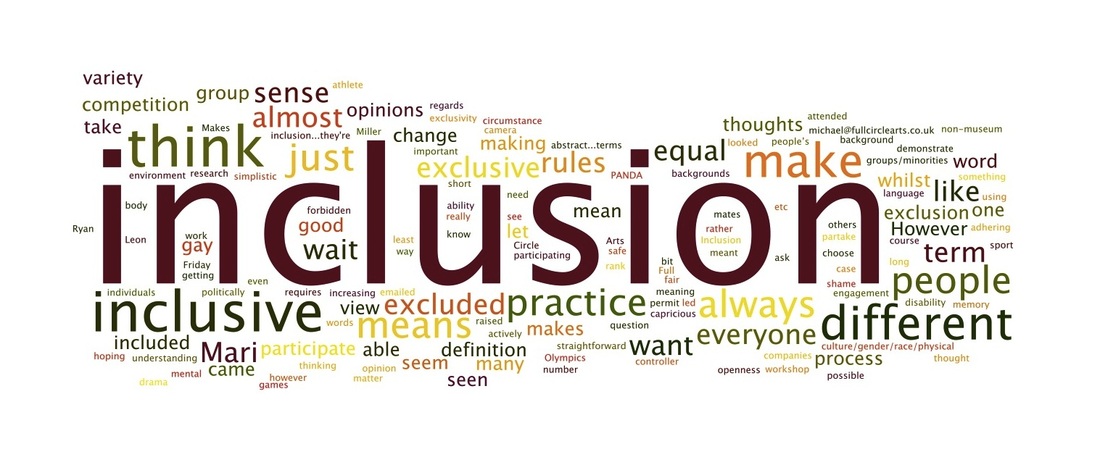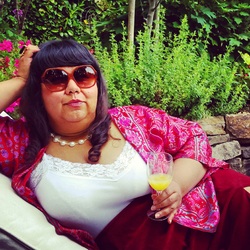|
I just gave a teleconferenced lecture for students of the Widener Human Sexuality Studies program this morning (yes, people are learning on a Sunday!). One of the students submitted the following question:
"The mainstream body-positivity movement lacks in intersectionality, often focusing its efforts still on thin-to-average able-bodied white women. What are some ways that folks within the movement can work on a paradigm shift toward including, for instance, disabled bodies and bodies of color, among other marginalized groups?" I found that I had a LOT to say about this topic, but I was particularly struck by the concept of "including" marginalized people. The word "inclusion" is a buzzword in political organizing that typically indicates some vague understanding that something just isn't right here. The idea of inclusion is typically thought of as an innocuous way of discussing the perceived lack of meaningful engagement by people who are experiencing the greatest impact of the political issue at hand. But I don't think it's an innocuous idea. I think there's a lot embedded in that word, and so I wanted to give you three reasons to rethink the idea of inclusion. Are you ready? First, embedded within the idea of "inclusion" is a kind of white supremacist/heteropatriarchal/thincentric/ableist framework or epistemology – the presumption that thin people need to create space for fat people or white people need to create space for people of color or that straight people need to create space for queers or that able-bodied people need to create space for disabled people. This kind of presumes that we are not already organizing or creating meaning in a way that works for us. To put it bluntly, people with hella privilege cannot even imagine that people with less privilege would be doing something super cute/amazing/dare-I-say better without them. And this is super presumptuous and also just inaccurate. Likewise, I think that movements led by marginalized folks are specifically interested in being un-seen by movements led by people with hella privilege. Second, any movement that engages heavily with reinscribing dominant aesthetics – or respectability politics – is not going to be of interest to marginalized folks who see that dominant aesthetic as problematic and violent. Focusing on "inclusion" bypasses the idea that there may be core value differences. I've learned in observing and participating in queer fat politics that organizing was based around the idea that the state was always going to be fucked up and disinterested in promoting any real holistic justice. So, rather than focus energy on trying to win our way into the hearts and minds of the American people, the focus was on the needs of the people who were dealing with the hardest shit. These are not particularly "glamorous" or capitalism-engaged aspects of survival. A lot of strategies among people dealing with intense levels of marginalization focus on getting people immediate care – sometimes physical, sometimes emotional, things like meds, food, housing, scooters, interventions for extreme isolation, etc. These are things that the larger body positivity movement has no interest in addressing because there is a real risk of losing traction – of losing legibility - in the greater culture if these become focal points. "Body positivity" is by its very name a white or middle class movement because positivity is not a resource that is at the top of the list for people with multiple marginalized identities. Finally, and - in my opinion - most importantly, is that the word "inclusion" presumes the maintenance of that movement's current leadership with the understanding that these "included" people will become absorbed into that movement without any radical rehaul of its current hierarchy. This idea reinscribes the idea that the status quo needs a few edits but is largely headed in the right direction. But is it frealz though? This fatty says noo. I think we come to 2 important questions: 1. What do the people who see inclusion need or want from the inclusion of people who are not well-represented? I think this is an incredibly important question for organizers to ask themselves. We all kind of know that a lack of poc or big bodies or trans folks is an indication of a failure, but do organizers desire their inclusion simply as evidence that they are not failing or is there some greater desire to be in service to people who are experiencing the greatest impacts of marginalization? 2. Is the individual or group who is seeking "inclusion" ready to change up the agenda, the political tools they use, or the hierarchy of leadership? So deep! I'm going to leave it at that. Work it out! xo, Virgie
1 Comment
2/28/2015 04:08:31 pm
This essay is brilliant, and one thing that especially strikes me is her two questions at the end. In the first one, specifically, she asks, "...do organizers desire their inclusion simply as evidence that they are not failing or is there some greater desire to be in service to people who are experiencing the greatest impacts of marginalization?"
Reply
Your comment will be posted after it is approved.
Leave a Reply. |
Virgie Tovar
Virgie Tovar, MA is one of the nation's leading experts and lecturers on fat discrimination and body image. She is the founder of Babecamp (a 4 week online course focused on helping people break up with diet culture) and the editor of Hot & Heavy: Fierce Fat Girls on Life, Love and Fashion (Seal Press, 2012). She writes about the intersections of size, identity, sexuality and politics. See more updates on Facebook. Archives
April 2021
Categories
All
|




 RSS Feed
RSS Feed